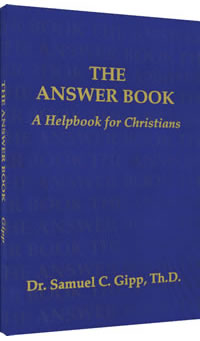New Bible Translations: Are They Really Easier To Understand?
Here, excerpted from "The Answer Book" on Bible translations by Dr. Samuel Gipp, is an interesting and thought-provoking approach to this question.
Question: Aren't modern English translations easier to understand?
Answer: No. Some may seem easier to read, but none are easier to understand.
Explanation: One of the primary advertising gimmicks used to sell modern English translations is that they will be easier to understand for the potential customers.
The customer, having been assured that he/she cannot possibly understand the "old archaic" King James gratefully purchases the modern English Bible and unknowingly condemns themselves to a life of biblical ignorance. Modern English translations may be easier to read but they are not easier to understand.
Let's look at the equation in simple terms. If the "archaic" language and the "thee's" and "thou's" of the King James Bible really do hamper the effectiveness of the Holy Spirit in communicating His message to the Christian, then several things should be true of one or all of the raft of modern English translations on the Bible market today.
1. If modern English translations, such as the New American Standard Version, New International Version, New King James Version, and Today's English Version were easier to understand, then the Holy Spirit's message to the Christian would flow freer and accomplish greater spiritual victories in the lives of God's people on an individual basis. Yet it is sadly evident that this is not happening.
In fact it is only too evident to any objective observer that today's Christians are more worldly and less dedicated to Jesus Christ than their nineteenth or even early twentieth century counterparts who were raised on and read the King James Bible. Surely a Bible that was "easier to understand" would have dramatically increased successes in battling sin, worldliness and carnality, but this just has not happened.
2. Secondly, if the modern English translations were really easier to understand then I believe God would show a little more gratitude for them by using at least one to spark a major revival in this nation. It is elementary to see that if the "old archaic" King James Bible has been hampering the desired work of the Holy Spirit, then God should be eager to bless the use of any translation that would be easier for his people to understand. Again, it is all too obvious that no mass spiritual awakening of any kind has been initiated by any one of today's modern translations. Today's modern translations haven't been able to spark a revival in a Christian school, let alone be expected to close a bar.
In fact, since the arrival of our modern English translations, beginning with the ASV of 1901, America has seen:
- God and prayer kicked out of our public schools
- Abortion on demand legalized
- Homosexuality accepted nationally as an "alternate life style."
- In home pornography via TV and VCR.
- Child kidnapping and pornography running rampant.
- Dope has become an epidemic.
- Satanism is on the rise.
If this is considered a "revival" then let's turn back to the King James to stop it. In fact, the only scale used to claim success for a new translation is how well it sells. This depraved Madison Avenue sales system should set alarms ringing in the Christian. Instead, deluded by television, they dutifully nod and remark that, "It must go good, everybody's buying one."
Is there any "good" coming from modern translations? Sure. The publishing companies are making millions. Today American Christians are spiritually anemic. They turn instead to their favorite "Bible psychologist" for help rather than Scripture. America as a whole is as morally decayed as Sodom and Gomorrah. (Ezekiel 16:49). Where is the spiritual help and hope that an "easier to understand" translation should bring? Instead, perhaps we are in this desperate condition because of those very translations
- See more articles on related topics:
- Bible Versions
- King James Bible
- Modern Versions
More on Bible Versions:
Products of Interest:
-

Answer Book, The
165 pages
Over 60 of the most commonly asked questions about Bible versions are answered in an easily understood style. -

51 Reasons Why The King James
224 pages
Here are 51 reasons to trust that God kept His promise to preserve His own words. -

Answers to Your Bible Version Questions
224 pages
David W. Daniels answers difficult questions about the KJV. Learn how to defend the KJV and why you can trust it. -

Understandable History of the Bible
557 pages
You'll learn the history of the Bible in this well-documented but easy-to-understand book.



